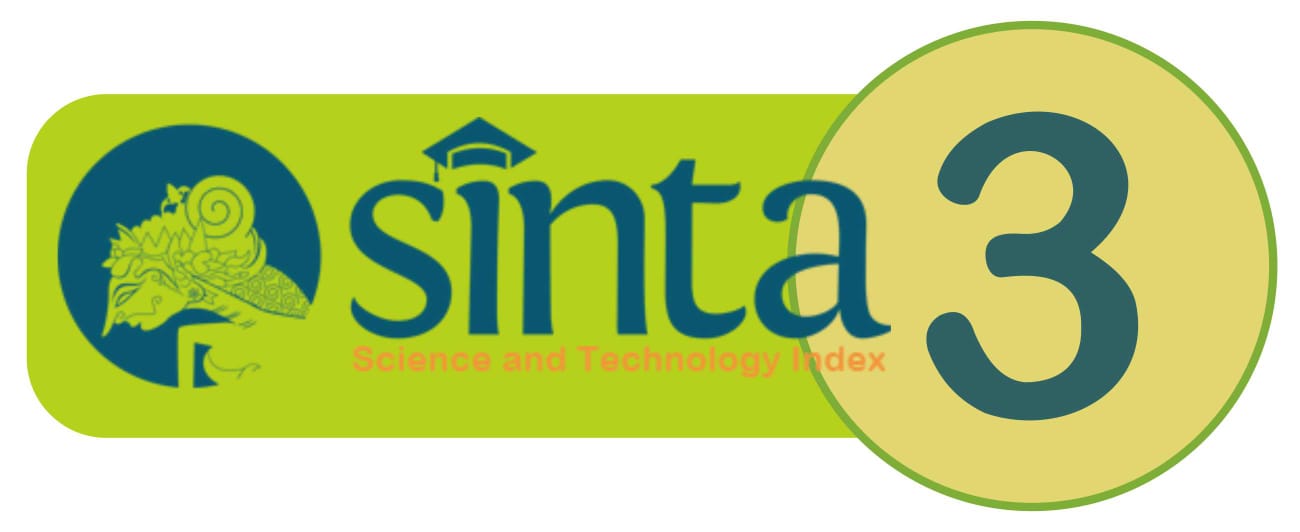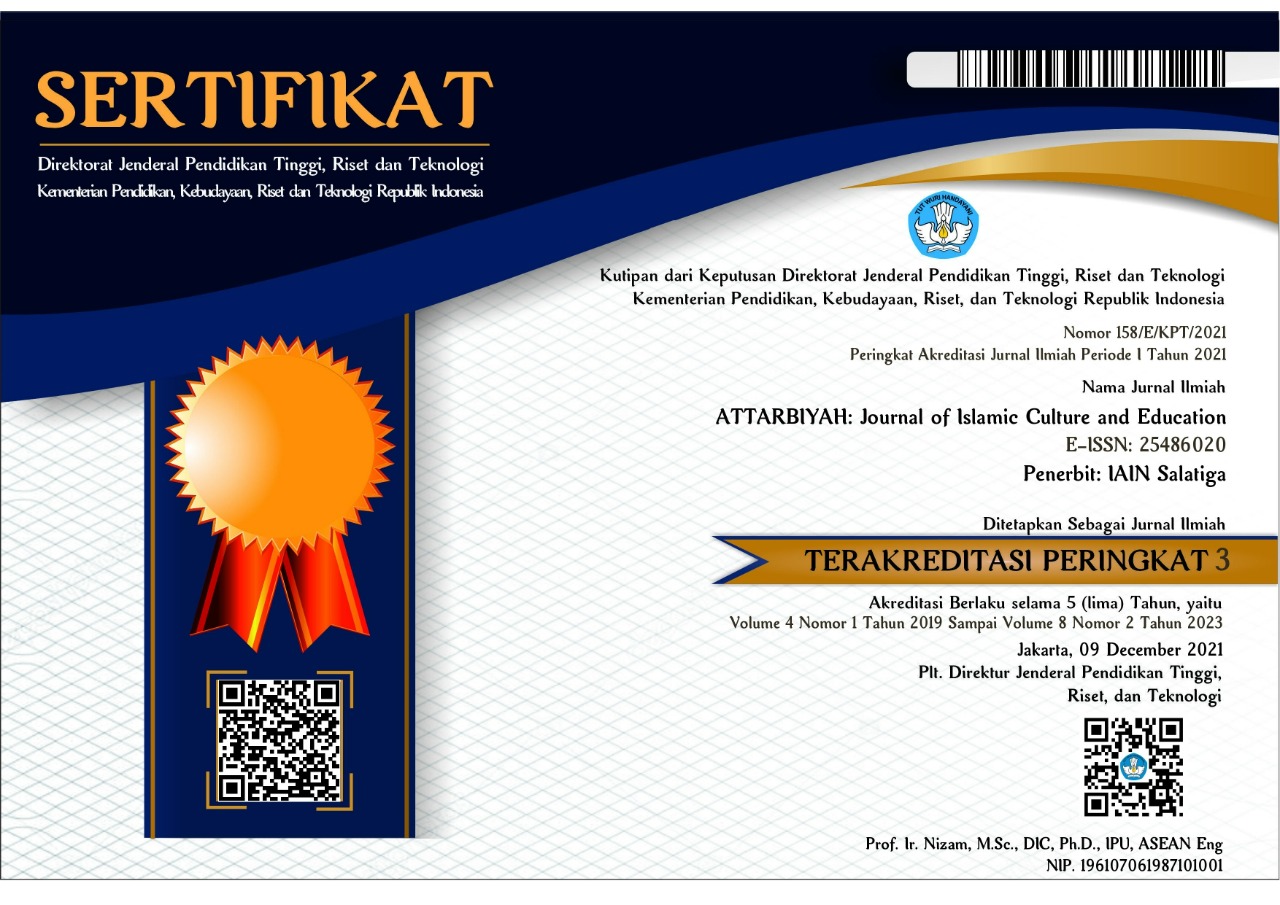Entrepreneurship education from the perspective of law and Islam
Abstract
Entrepreneurship education is a concept that must be socialized on a large scale. This is stated in Presidential Regulation 5 of 2010 concerning the National Medium-Term Development Plan (RPJMN). The study in this article covers the concept of entrepreneurship education in general, and the practices carried out by the famous Islamic figure, the Prophet Muhammad, and his companions. It will guide entrepreneurs to stick to the values of previous Muslim entrepreneurs. This article aims to explain the concept of entrepreneurship education and what has been done by the Prophet Muhammad and his companions. The methodology used in this research is library research. The approach used is historical and content analysis to
produce a broad and contextual picture. The stages of this method are collecting primary sources that are thematic and then reinforced with secondary sources and contextualizing. The findings in this paper about the values of entrepreneurship education in general at the Ministry of National Education are Independent, Creative, Dare to Take Risks, Action Oriented, Leadership, Hard Work, Honesty, Discipline, Innovativeness, Responsibility, Cooperation, Never Giving Up, tenacious, Commitment, Realistic, Curiosity, Communicative, Strong motivation to succeed. The Quraysh had practiced the spirit of entrepreneurship education, as did Hasyim bin 'Abdul Manaf, which the Prophet then practiced from an early age to adulthood, and his closest friends who became successful entrepreneurs, such as Abdurrahman bin Auf.
Keywords
Full Text:
PDFReferences
Afzalurrahman. (2000). Muhammad Sebagai Seorang Pedagang. Yayasan Swarna Bhumy.
Algabri, H. K., Taha, Y. A., Gaikwad, S. S., & Kamat, R. K. (2020). Curriculum technology integration for higher education. Journal of Advanced Research in Dynamical and Control Systems, 12(1). https://doi.org/10.5373/JARDCS/V12I1/20201043.
Fatwa Dewan Syari'ah Nasional Tentang Pembiayaan Mudharabah (Qiradh), (2000).
An-Nahlawi, A. (1995). Pendidikan Islam di Rumah, Sekolah, dan Masyarakat. GIP.
Antonio, M. S. (2008). Muhammad SAW: The Super Leader Super Manager (Cet-13). Tazkia Publishing & ProLM Centre.
Arbani. (2020). Pengaruh pembelajaran kewirausahaan terhadap menumbuhkan motivasi berwirausaha mahasiswa di sekolah tinggi agama islam auliaurrasyidin tembilahan. Jurnal Ekonomi Dan Bisnis Islam.
As-Shalabi. A. M. (2004). Al-Sirah an-Nabawiyah, 'Ardh Aqai'i wa Tahlil Ahdats. Dar al-Nafa'is.
Azmi, I. A. G. (2014). The implementation of Islamic business practices of women traders: A study in an Islamic state in a developing country. Global Journal Al-Thaqafah, 4(2). https://doi.org/10.7187/gjat632014.04.02
Baker, A. & Zubair, A. C. (1990). Metode Penelitian Filsafat. Kanisius.
Barnett, R. A. (1981). Integration in Curriculum Design in Higher Education. Journal of Further and Higher Education, 5(3), 33–45. https://doi.org/10.1080/0309877810050306.
Basrowi. (2011). Kewirausahaan Untuk Perguruan Tinggi. Penerbit Ghalia Indonesia.
Crisan, D. A., Joita, A. C., Zwaga, H., & Sebea, M. (2014). Integration of Entrepreneurship With Ict Competencies Into Higher Education Institutions Curricula: a Proposal. Journal of Information Systems & Operations Management.
Daryanto. (2012). Pendidikan Kewirausahaan (Cetakan 1). Gava Media.
Fadhlurrahman. (2022). Pendidikan Kewirausahaan Dalam Islam (Hatib Rahmawan (Ed.). UAD Press.
Galus, B. S. (2013). Relevansi Pendidikan Kewirausahaan Di Perguruan Tinggi. Tulisan ini pernah disampaikan pada Seminar Nasional, bertema Pendidikan Kewirausahaan di Perguruan Tinggi, diselenggarakan oleh Universitas PGRI Yogyakarta, tanggal 9 Januari 2009.
R e l e v a n s i Pe n d i d i k a n K e w i r a u s a h a a n D i Pe r g u r u a n T i n g g i - dikpora.jogjaprov.go.id.html.
Hadi, S. (1995). Metodologi Research. Andi Offset.
Harahap, R. F. (2013). Indonesia Butuh Pendidikan Kewirausahaan!
Hisrich, R. (2008). Entrepreneurhip. Mc Graw Hill.
Hoerniasih, N. (2017). Penerapan Nilai-nilai Agama Islam dalam Mengembangkan Pendidikan Kewirausahaan di Pondok Pesantren. Seminar Nasional Pendidikan Nonformal FKIP Universitas Bengkulu, 1.
Kania, R., & Februadi, A. (2021). Studi Eksploratif Dampak Pendidikan Kewirausahaan terhadap Minat Berwirausaha. Jurnal Manajemen Bisnis Dan Kewirausahaan, 5(1). https://doi.org/10.24912/jmbk.v5i1.9138
Karim, A. (2013). Kitab Sejarah Nabi Muhammad Saw (Cet-1). Diva Press.
Kasih, Y. (2013). Mewujudkan Pendidikan Kewirausahaan di Perguruan Tinggi Melalui Proses Pembelajaran yang Berkelanjutan. Forum Bisnis Dan Kewirausahaan Jurnal Ilmiah STIE MDP, 2(2).
Kridalaksana, H. (1994). Kamus Besar Bahasa Indonesia (Edisi Kedua). Balai Pustaka.
Kurniyawati, A. (2020). Peran Minat Berwirausaha Dalam Pengaruh Pelatihan Kewirausahaan Terhadap Tingkat Pendapatan Keluarga Dalam Prespektif Ekonomi Islam. In Sell Journal (Vol. 5, Issue 1).
Lampito, O. (2014). Lulusan PT Perlu Sentuhan Akhir.
Mochlasin, M., & Krisnawati, W. (2016). Faktor-Faktor yang Mempengaruhi Perilaku Kewirausahaan Enterpreneur Muslim Salatiga. Muqtasid: Jurnal Ekonomi Dan Perbankan Syariah, 7(2). https://doi.org/10.18326/muqtasid.v7i2.73-94.
Muklis Umar (Ed.). (n.d.). al-Qur'an al-Kariim. PT Insan Media Pustaka.
Prasetyaningsih, A. (2016). Membentuk Jiwa Kewirausahaan pada Anak Usia Dini melalui Kegiatan “Market Day.” SELING: Jurnal Program Studi.
Rachman, T. (2014). Wilmar Gandeng ITB Kembangkan Pendidikan Berbasis Kewirausahaan. http://www.republika.co.id/berita/pendidikan/dunia-kampus/14/02/25/n1jirmwilmar-gandeng-itb-kembangkan-pendidikan-berbasis-kewirausahaan.
Rahayu, E. S., Suwarsa, O., & Tarawan, V. M. (2019). Pendidikan Kewirausahaan Berhubungan Dengan Intensi Berwirausaha Berdasar. JURNAL KESEHATAN PRIMA, 13(2).
Roqib, M. (2009). Ilmu Pendidikan Islam (pengembangan pendidikan integratif di sekolah, keluarga dan masyarakat). LKIS.
Rudhy Dwi Chrysnaputra, & Wahyoe Pangestoeti. (2021). Peran dan Fungsi Kewirausahaan Islam dalam Pembangunan Ekonomi Indonesia. Al-Iqtishod : Jurnal Ekonomi Syariah, 3(1). https://doi.org/10.51339/iqtis.v3i1.301.
Santoso, T., Giyoto, G., Baidi, B., & Kusmanto, H. (2021). Challenges of Al Islam and Kemuhammadiyahan (AIK) Learning with Baitul Arqam Model. Al-Tanzim: Jurnal Manajemen Pendidikan Islam, 5(1). https://doi.org/10.33650/al-tanzim.v5i1.1644.
Saroni, M. (2012). Mendidiki & Melatih Entrepreneur Muda: Membuka Kesadaran Atas Pentingnya Kewirausahaan Bagi Anak Didik (Cetakan ke). ar-Ruzz Media.
Schramm, C. J. (2007). Entrepreneurship in American Higher Education: A Report from the Kauffman Panel on Entrepreneurship Curriculum in Higher Education. Www.Kauffman.Org.
Shihab, M. Q. (2012). Membaca Sirah Nabi Muhammad Saw. Penerbit Lentera Hati. Simon Bridge, & Hegarty, C. (2016). Reconceptualising Curriculum Design for Entrepreneurship in Higher Education. AISHE-J - The All Ireland Journal of Teaching and Learning in Higher Education, 8(1).
Surahmad, W. (2004). Dasar dan Teknik Research. Tarsito.
Susilaningsih, S. (2015). Pendidikan Kewirausahaan Di Perguruan Tinggi: Pentingkah untuk Semua Profesi? Jurnal Economia, 11(1).https://doi.org/10.21831/economia.v11i1.7748.
Timmons, J.A. dan Spinelli, S. (2008). New Venture Creation : Entrepreneurship For The 21st Century (Julianto Agung Saputro (Ed.)). Penerbit Andi.
Ulya, I. (2018). Entrepreneurship Education in Islamic Higher Education (Paradigm of Higher Education Curriculum Development Based on Entrepreneurship). Ijtimā'iyya: Journal of Muslim Society Research, 3(1). https://doi.org/10.24090/ijtimaiyya.v3i1.1726.
Wahidmurni, W. (2020). Evaluation of entrepreneurship education in Islamic religious higher education institutions in Indonesia. International Journal of Innovation,Creativity and Change, 13(7).
Wibowo, S., & Pramudana, K. (2016). Pengaruh Pendidikan Kewirausahaan terhadap Intensi Berwirausaha Yang Dimediasi oleh Sikap Berwirausaha. None, 5(12).
Wijayanti, & Fatimah, N. (2018). Aktualisasi Pendidikan Karakter di Sekolah. An-Nisa', 11(1).
Zahara, M. A. (2019). Silsilah Nasab dari Nabi Muhammad hingga Nabi Adam. Https://Islam.Nu.or.Id/Post/Read/105023/Silsilah-Nasab-Dari-Nabi-MuhammadHingga-Nabi-Adam.
Zin, A. A. M., & M. Buchik. (2017). Isu dan Cabaran Pendidikan Remaja Muslim di Malaysia. Journal of Al-Tamaddun, 12(2). https://doi.org/10.22452/jat.vol12no2.4.
Zulhimma. (2018). Upaya Kewirausahaan Dalam Meningkatkan Kemandirian Ekonomi Lembaga Pendidikan Islam. Tazkir : Jurnal Penelitian Ilmu-Ilmu Sosial Dan Keislaman, 4(2).
DOI: https://doi.org/10.18326/attarbiyah.v7i1.45-61
Refbacks
- There are currently no refbacks.

ATTARBIYAH: Journal of Islamic Culture and Education by http://attarbiyah.iainsalatiga.ac.id/ is licensed under a Creative Commons Attribution-ShareAlike 4.0 International License
----------------------------------------------------------
ATTARBIYAH : Journal of Islamic Culture and Education IAIN SALATIGA p-ISSN: 0215-9996, e-ISSN: 2548-6020



